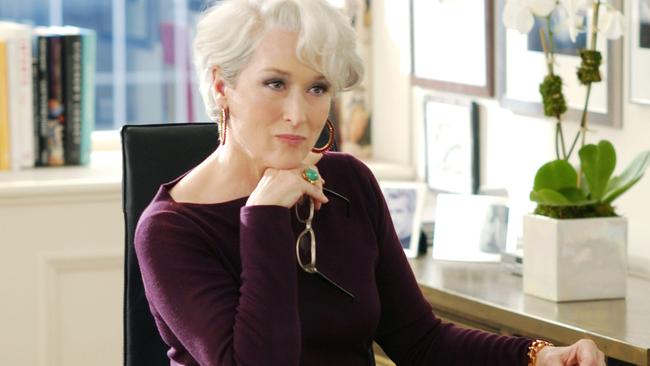Why women tread on each other: ‘We get in charge and act like bitches’
IT’S controversial. But why are the worst enemies of women at work often other women? There’s actually a reason.

Lifestyle
Don't miss out on the headlines from Lifestyle. Followed categories will be added to My News.
“SOMETIMES women are their own worst enemies. What happens when other women don’t support you?” a woman in the audience asks. She’s addressing a panel discussing gender equality at the National Press Club.
Her question makes me snap to attention. This is the same jarring question I’ve repeatedly asked myself over many years — and never found a satisfactory answer to.
Taking an honest look at my own life experiences, the uncomfortable truth is that the majority of people who bullied me at work and discriminated against me — especially around things like maternity leave, opportunity for promotion and working part time — were other women.
While dear women friends have always been a great support to me and continue to be, I’m hounded by this knowledge and it prompts me to wonder: How often are women holding other women back, putting them down and marginalising them?
After snooping around, I discover that the woman who asked the question is named Zoe Thorne and she’s currently a senior manager at Ernst and Young.
Before that Zoe spent 19 years in army. She noticed that in her former workplace, some women didn’t support each other. They seemed to view treading on other females as an opportunity to get ahead. And it bothered Zoe.
Just like Zoe, this behaviour plonks me deep into a kind of ideological quick sand. I’m a feminist. I don’t eat men for breakfast (and in fact, am married to quite a nice one). My belief is simply that men and women are equal and deserve equal opportunities.
Running right alongside this tightly held belief is my fierce hope that women will support other women.
Frequently they don’t, though. This is the message I get loud and clear after throwing the issue open on social media.
Appearance activist and writer Carly Findlay acknowledges the support she receives from other women but also says: “I have received a lot of crushing nastiness from women too. And it’s hard to speak up about it, as you say, because we are supposed to be about the sisterhood.”
Another contact of mine — let’s call her Emma* — is vibrant and thoughtful academic. She has been undermined by a number of other female colleagues, including a supervisor.
“On the surface women are saying that they support other women but the minute their sense of confidence or security might be in question, they go into fear mode, and start being awful to other women,” Emma says.
Sandra,* who works as a middle manager in the public service, says she’s “absolutely had the most trouble with female bosses and staff.”
“It’s almost like women don’t want to be seen to be weak or giving in, or favouring women, so they act badly or act like they think a man would act.
“I’ve also had issues with women staff who feel young women get given everything and won’t be flexible for women working part time or about to go on maternity leave, because they never got it.
“As one friend said, ‘Bloody women. We get in charge and then we act like bitches and the men stand back and say — we knew this is what would happen’,” Sandra says.
Digesting the deluge of first-person anecdotes, it would easy to simply brush off this behaviour as something innate to women. “They are nasty cows!” I hear you cry.
Not so fast. In reality, this is way too simplistic. Women who treat other women badly are not acting in a vacuum.
Business coach Samantha Nolan-Smith puts it like this: “I’ve always viewed this as the powerless fighting for the scraps, so to speak. People bully those they feel to be less powerful than them.”
Then there’s the so-called “patriarchal bargain” — a notion brought to my attention by research scientist Nadiah Kristensen.
She describes this as “the idea that women, or any subjugated group within any system I think, will adopt and uphold the system in order to gain power for themselves.”
“Saying it like that makes it sound nefarious, like that women are consciously selling-out their sisters for selfish reasons, but in an dominance/subjugation system, the subjugated must do whatever they can to get by,” Nadiah says, “it’s a bargain everyone must make.”
Jess, who works in the non-profit sector, agrees we need to examine “how patriarchy recruits all of us to varying degrees to help maintain itself.”
“It’s really important to recognise that sexism, while it benefits men in particular, can also benefit particular women. A sexist woman doesn’t necessarily get all the benefits men get, but it does tend to bump them up the hierarchy,” she says.
So on this International Women’s Day, let’s remember that according to former US Secretary of State, Madeline Albright: “There’s a special place in hell for women who don’t help each other.”
How are you treating the women around you? Maybe you’d best offer a helping hand instead of a pounding foot. That way, you’ll avoid rotting in purgatory.
*Not her real name

Ginger Gorman is an award winning print and radio journalist, and a 2016 TEDx Canberra speaker. Follow her on Twitter @GingerGorman
Originally published as Why women tread on each other: ‘We get in charge and act like bitches’


